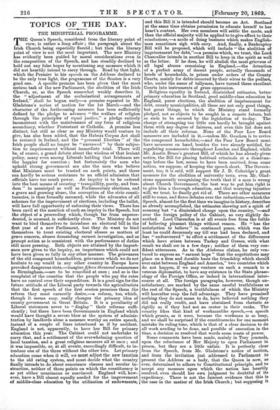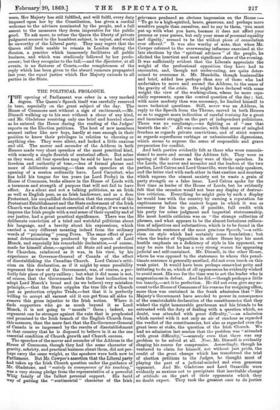TOPICS OF THE DAY.
THE MINISTERIAL PROGRAMME THE Queen's Speech, considered from the literary point of view, is rather a limp affair ; the paragraph about the Irish Church being especially flaccid ; but then the literary point of view is not the most important. The new Ministry has evidently been guided by moral considerations even in the composition of the Speech, and has steadily declined to hold out any false hopes by mentioning any measure which it did not heartily intend to carry through. Read by that light, which the Premier in his speech on the Address declared to be the only true light, the programme of the Session is a very good one. A specific promise has been given that the most serious task of the new Parliament, the abolition of the Irish Church, or, as the Speech somewhat weakly describes it, the " adjustment of the ecclesiastical arrangements of Ireland," shall be begun early—a promise repeated in Mr. Gladstone's notice of motion for the 1st March—and the character of the forthcoming measure has been sufficiently defined by the pledge to advance "the welfare of religion through the principles of equal justice," a pledge entirely inconsistent with the maintenance of any form of religious ascendancy, whether Protestant or Catholic. A promise less distinct, but still as clear as any Ministry would venture to give, has also been added, that the Habeas Corpus Act shall be restored in Ireland, and the "personal liberties" of the Irish people shall no longer be " narrowed " by their subjection to imprisonment without immediate trial. There will be, of course, a grand debate about the wisdom of that lenient policy, many even among Liberals holding that Irishmen are the happier for coercion ; but fortunately the men who uphold strong government are also the men who believe that Ministers must be trusted on such points, and there can hardly be serious resistance to an official admission that officials have too much power. An inquiry is to be ordered into the best means of securing "tranquillity, purity, and freedom" in municipal as well as Parliamentary elections, and a grave and growing abuse, the corruption of the civic constituencies, is thus formally menaced, while the advocates of all schemes for the improvement of elections, including the ballot, will have full opportunity of enforcing their views. There has been cavil at the mention of such an inquiry in the Speech, but the object of a proceeding which, though far from unprecedented, is unusual, is sufficiently clear. The Ministry do not want to bind themselves to introduce an electoral bill in the first year of a new Parliament, but they do want to bind themselves to treat existing electoral abuses as matters of grave concern, abuses demanding earnest investigation, and as prompt action as is consistent with the performance of duties still more pressing. Both objects are attained by the importance now given to the inquiry, an importance which could not have been given so fully in any other manner. The grievances of the old compound householders, grievances which we do not hesitate to say would in any other country in Europe have provoked dangerous riots,—imagine fifteen thousand summonses in Birmingham,—are to be remedied at once ; and so is the complaint of the counties that the people who pay the rates have no control over their expenditure. It is a good sign for the future attitude of the Liberal party towards the agriculturists that the first speech of the first session promises them the reform they most earnestly desire,—a reform, too, which, though it seems easy, really changes the primary idea of county government in Great Britain. It is a peculiarity of Liberal statesmen never to " display " their reforms sufficiently; but there have been Governments in England which would have thought a severe blow at the system of administration by landlords alone a measure worthy an entire speech, instead of a couple of lines introduced as if by accident. England is not, apparently, to have her Bill for primary education this year. The Cabinet could not undertake to carry that, and a settlement of the overwhelming question of local taxation, and a great religious measure all at once ; and it was impossible, or, at all events, exceedingly difficult, to introduce one of the three without the other two. Let primary education come when it will, we must adjust the new taxation to the old rating system, and must decide what the country finally intends to do about conscience clauses and secular instruction, neither of them points on which the constituency is as yet either unanimous or convince& England will, however, have a Bill almost equally needed for the improvement of middle-class education by the utilization of endowments, and this Bill it is intended should become an Act. Scotland at the same time obtains permission to educate herself to her heart's content. Her own members will settle the mode, and then the official majority will be applied to to give effect to their conclusions,—a mode of doing business which makes Englishmen sometimes sigh with envy. And, finally, a Bankruptcy Bill will be proposed, which will include "the abolition of imprisonment for debt,"—a promise which, we trust, the Lord Chancellor intends in another Bill to keep in the spirit as well as the letter. If he does, he will abolish the most grievous of all legal abuses remaining in England,—the detention of a perfect army of decent people, actually thousands of heads of households, in prison under orders of the County Courts, mainly for debts incurred by their wives to the pedlars,. who, under the name of tallymen, have turned these excellent, Courts into instruments of gross oppression. Religious equality in Ireland, diminished estimates, better primary education in Scotland, good middle-class education in England, purer elections, the abolition of imprisonment for debt, county municipalities, all these are not only good things, but great things, to which the Ministry stand formally pledged, not as objects to be sought in a remote future, but as ends to be secured by the legislation of to-day. The charge of attempting too little can hardly be brought against them with any degree of fairness, and even this list does not include all their reforms. None of the Poor Law Board measures are included in it,—unless Mr. Goschen is to revive the compound householder,—and the Poor Law Board mint have measures on hand, besides the two already notified, for regulating assessments throughout London and England, while Mr. Austin Bruce's greatest Bill, of which he has already given notice, the Bill for placing habitual criminals at a disadvantage before the law, seems to have been omitted, from some notion, we suppose, of keeping the speech short. The Government, too, it is said, will support Sir J. D. Coleridge's great measure for the abolition of university tests, even Mr. Gladstone apparently recognizing the truth that if a man is wrong about Church Government, the best way to put him right is to give him a thorough education, and that worrying injustice will, we trust, be finally got rid of. There are other measuresstill to come, and fierce debates over the reductions,—which the Speech, almost for the first time we imagine in history, describesas already accomplished, the estimates showing not a spirit of economy but "a diminished charge upon the country,"—and over the foreign policy of the Cabinet, so very slightly described. Lord Clarendon is at all events free from the foible of believing pleasant things without reason. He "has the satisfaction to believe" in continued peace, which was the least he could decorously say till war had been declared, and has " endeavoured " to effect a settlement of the differences.
which have arisen between Turkey and Greece, with what result we shall see in a few days ; neither of them very con fident utterances. As to the Alabama claims, he only ven tured to express an "earnest hope" that the negotiations may place on a firm and durable basis the friendship which should ever exist between England and America," two countries which do not happen, if we may venture on such a remark to a. veteran diplomatist, to have any existence in the State phrase ology of the Foreign Office, or indeed in international inter course at all. The foreign paragraphs, however, though unsatisfactory, are marked by the same careful truthfulness as the rest of the Speech, a truthfulness of which the Ministry will hereafter reap the full advantage. They have promised nothing they do not mean to do, have believed nothing they did not really credit, and have abstained from rhetoric as rigidly as if they had not an orator in their ranks. The country likes that kind of workmanlike speech,—a speech which grunts, as it were, because the workman is so busy, and we shall be surprised if the constituencies for one momentmistake its ruling tone, which is that of a clear decision to do all work needing to be done, and possible of execution in the time, a decision so resolved that words seem waste of power. Some comments have been made, -mainly in Tory journals, upon the reluctance of Her Majesty to open Parliament in person, but they are a little unfair. It is perfectly clear from the Speech, from Mr. Gla,dstone's notice of motion, and from the invitation just addressed to Parliament to present the Address as a body, that the Queen is now, as ever, determined to adhere to Constitutional principle, and to accept any measure upon which the nation has heartily resolved, even should her own judgment be doubtful of its. expediency. There is not the faintest evidence that this Is the case in the matter of the Irish Church ; but supposing it -were, Her Majesty has still fulfilled, and will fulfil, every duty imposed upon her by the Constitution, has given a cordial welcome to the advisers nominated by the people, and a full assent to the measures they deem imperative for the public good. To ask more, to refuse the Queen the liberty of private judgment secured to the humblest subject, is unjust, and would be unworthy of the Liberal party. They may regret that the Queen still feels unable to remain in London during the Session, a practice which immensely facilitates all public business, and which was studiously followed by her predecessor; but they recognize to the full,—and the Spectator, at all events, is no flatterer of Courts,—the completeness of the reply which has been given to the absurd rumours propagated last year, the equal justice which Her Majesty extends to all parties in the State.



































 Previous page
Previous page